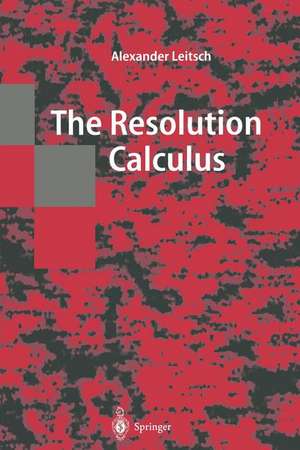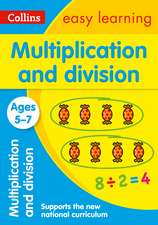The Resolution Calculus: Texts in Theoretical Computer Science. An EATCS Series
Autor Alexander Leitschen Limba Engleză Paperback – 28 sep 2011
Din seria Texts in Theoretical Computer Science. An EATCS Series
- 20%
 Preț: 319.34 lei
Preț: 319.34 lei - 20%
 Preț: 341.30 lei
Preț: 341.30 lei - 20%
 Preț: 199.04 lei
Preț: 199.04 lei - 20%
 Preț: 430.64 lei
Preț: 430.64 lei -
 Preț: 383.93 lei
Preț: 383.93 lei - 20%
 Preț: 345.26 lei
Preț: 345.26 lei - 20%
 Preț: 599.76 lei
Preț: 599.76 lei - 20%
 Preț: 332.06 lei
Preț: 332.06 lei -
 Preț: 465.70 lei
Preț: 465.70 lei - 20%
 Preț: 727.14 lei
Preț: 727.14 lei - 15%
 Preț: 591.28 lei
Preț: 591.28 lei -
 Preț: 399.50 lei
Preț: 399.50 lei - 20%
 Preț: 362.57 lei
Preț: 362.57 lei - 20%
 Preț: 332.06 lei
Preț: 332.06 lei - 20%
 Preț: 999.85 lei
Preț: 999.85 lei - 20%
 Preț: 601.92 lei
Preț: 601.92 lei - 20%
 Preț: 341.63 lei
Preț: 341.63 lei - 20%
 Preț: 354.71 lei
Preț: 354.71 lei - 20%
 Preț: 644.95 lei
Preț: 644.95 lei - 20%
 Preț: 655.83 lei
Preț: 655.83 lei -
 Preț: 394.29 lei
Preț: 394.29 lei - 20%
 Preț: 339.14 lei
Preț: 339.14 lei - 15%
 Preț: 712.54 lei
Preț: 712.54 lei - 20%
 Preț: 588.86 lei
Preț: 588.86 lei - 20%
 Preț: 722.66 lei
Preț: 722.66 lei - 20%
 Preț: 611.15 lei
Preț: 611.15 lei - 20%
 Preț: 421.47 lei
Preț: 421.47 lei - 20%
 Preț: 520.17 lei
Preț: 520.17 lei - 20%
 Preț: 502.83 lei
Preț: 502.83 lei -
 Preț: 387.96 lei
Preț: 387.96 lei - 20%
 Preț: 542.18 lei
Preț: 542.18 lei - 20%
 Preț: 336.35 lei
Preț: 336.35 lei - 20%
 Preț: 342.28 lei
Preț: 342.28 lei
Preț: 389.31 lei
Nou
Puncte Express: 584
Preț estimativ în valută:
74.50€ • 77.31$ • 62.27£
74.50€ • 77.31$ • 62.27£
Carte tipărită la comandă
Livrare economică 15-29 martie
Preluare comenzi: 021 569.72.76
Specificații
ISBN-13: 9783642644733
ISBN-10: 3642644732
Pagini: 316
Ilustrații: VIII, 300 p.
Dimensiuni: 155 x 235 x 17 mm
Greutate: 0.45 kg
Ediția:Softcover reprint of the original 1st ed. 1997
Editura: Springer Berlin, Heidelberg
Colecția Springer
Seria Texts in Theoretical Computer Science. An EATCS Series
Locul publicării:Berlin, Heidelberg, Germany
ISBN-10: 3642644732
Pagini: 316
Ilustrații: VIII, 300 p.
Dimensiuni: 155 x 235 x 17 mm
Greutate: 0.45 kg
Ediția:Softcover reprint of the original 1st ed. 1997
Editura: Springer Berlin, Heidelberg
Colecția Springer
Seria Texts in Theoretical Computer Science. An EATCS Series
Locul publicării:Berlin, Heidelberg, Germany
Public țintă
ResearchCuprins
The Basis of the Resolution Calculus.- First-Order Logic.- Transformation to Clause Form.- Term Models and Herbrand’s Theorem.- Decision Methods for Sets of Ground Clauses.- The Propositional Resolution Principle.- Substitution and Unification.- The General Resolution Principle.- A Comparison of Different Resolution Concepts.- 3. Refinements of Resolution.- A Formal Concept of Refinement.- Normalization of Clauses.- Refinements Based on Atom Orderings.- Lock Resolution.- Linear Refinements.- Hyperresolution.- Refinements: A Short Overview.- 4. Redundancy and Deletion.- The Problem of Proof Search.- The Subsumption Principle.- Subsumption Algorithms.- The Elimination of Tautologies.- Clause Implication.- 5. Resolution as Decision Procedure.- The Decision Problem.- A-Ordering Refinements as Decision Procedures.- Hyperresolution as Decision Procedure.- Hyperresolution and Automated Model Building.- 6. On the Complexity of Resolution.- Herbrand Complexity and Proof Length.- Extension and the Use of Lemmas.- Structural Normalization.- Functional Extension.
Textul de pe ultima copertă
This is a completely new presentation of resolution as a logical calculus and as a basis for computational algorithms and decision procedures.
The first part deals with the traditional topics (Herbrand's theorem, completeness of resolution, refinements and deletion) but with many new features and concepts like normalization of clauses, resolution operators, and search complexity.
Building on this foundation, the second part gives a systematic treatment of recent research topics. It is shown how resolution decision procedures can be applied to solve the decision problem for some important first-order classes. The complexity of resolution is analyzed in terms of Herbrand complexity, and new concepts like ground projection are used to classify the complexity of refinements. Finally, the method of functional extension is introduced; combined with resolution it gives a computational calculus which is stronger than most others.
The first part deals with the traditional topics (Herbrand's theorem, completeness of resolution, refinements and deletion) but with many new features and concepts like normalization of clauses, resolution operators, and search complexity.
Building on this foundation, the second part gives a systematic treatment of recent research topics. It is shown how resolution decision procedures can be applied to solve the decision problem for some important first-order classes. The complexity of resolution is analyzed in terms of Herbrand complexity, and new concepts like ground projection are used to classify the complexity of refinements. Finally, the method of functional extension is introduced; combined with resolution it gives a computational calculus which is stronger than most others.













